Trading Places: Back in government, Douglas Alexander is a new man
Nothing spoke more to the seismic shifting of the tectonic political plates in Scotland than when Douglas Alexander, a Labour MP for 18 years, a veteran of the Tony Blair years, a former government minister, and with a majority of 16,000, lost his seat in 2015 to the 20-year-old politics student Mhairi Black.
Like Black, Alexander was still a student, albeit a returning one, when he was first selected to stand for Westminster in 1995. The then 27-year-old had already been working as a speech writer and parliamentary researcher for Gordon Brown, before returning to university to study law, when he stood in the Perth and Kinross by-election caused by the death of the Conservative MP Nicholas Fairburn. And while the seat was ultimately won by the SNP’s Roseanna Cunningham, the young Alexander did well enough to push the Tories into third place, upping the Labour share of the vote by more than 10 per cent, and in doing so, smashing a number of Labour Party electoral records. It also, importantly, brought him to the attention of the leadership. As a result, in 1997 when Gordon McMaster, the Labour MP for Paisley South, sadly committed suicide, Alexander, who had grown up in Renfrewshire, was picked to contest the seat. This was, according to insiders, an example of the turf war between Gordon Brown and Tony Blair and in this case, Brown’s mentee Alexander was picked over Blair’s preference of Pat McFadden, as a Blair sop to his brooding chancellor. Alexander not only won the seat but did so handsomely, with an increased majority, and he went on to represent the area for almost two decades.
He was at the heart of the Blair/Brown government, holding various ministerial positions before being given roles in the Cabinet that included Secretary of State for Scotland, transport secretary, and latterly, Secretary of State for International Development. He also became the party’s UK campaign coordinator ahead of the unsuccessful 2010 general election, ironically a position that McFadden held ahead of last year’s election which brought Alexander back into politics and government. From 2010 and with Labour in opposition, Alexander co-chaired David Miliband’s unsuccessful leadership contest and later worked for Ed Miliband as the shadow work and pensions secretary before becoming shadow foreign secretary, which fuelled expectations that he would take that role in government after the Labour landslide in July last year. In the event, David Lammy became foreign secretary, having held the shadow role for some time, and the re-elected Alexander, who had been out of frontline politics for nine years but was one of Keir Starmer’s most experienced politicians, having previously worked across a number of very different briefs in government, was given the role of Minister of State for Trade Policy and Economic Security.
Tipped off by No 10 that he would get a call from the PM at half-time during the England vs Switzerland game in the Euros, in the event he had to wait until the nerve-wracking conclusion of the penalty shootout, which England won, to hear from the football-loving Starmer who, no doubt cheered by the win, offered Alexander the ministerial role which he immediately accepted. Given the frenzied media speculation that he was to be handed the foreign secretary role on a plate, he had already been sounded out on whether he would accept what might have been seen as a lesser position, but I am told by those close to the decision-making process that the 57-year-old not only welcomed his new role with a ‘boyish enthusiasm’, he was refreshingly just delighted to be back in government.
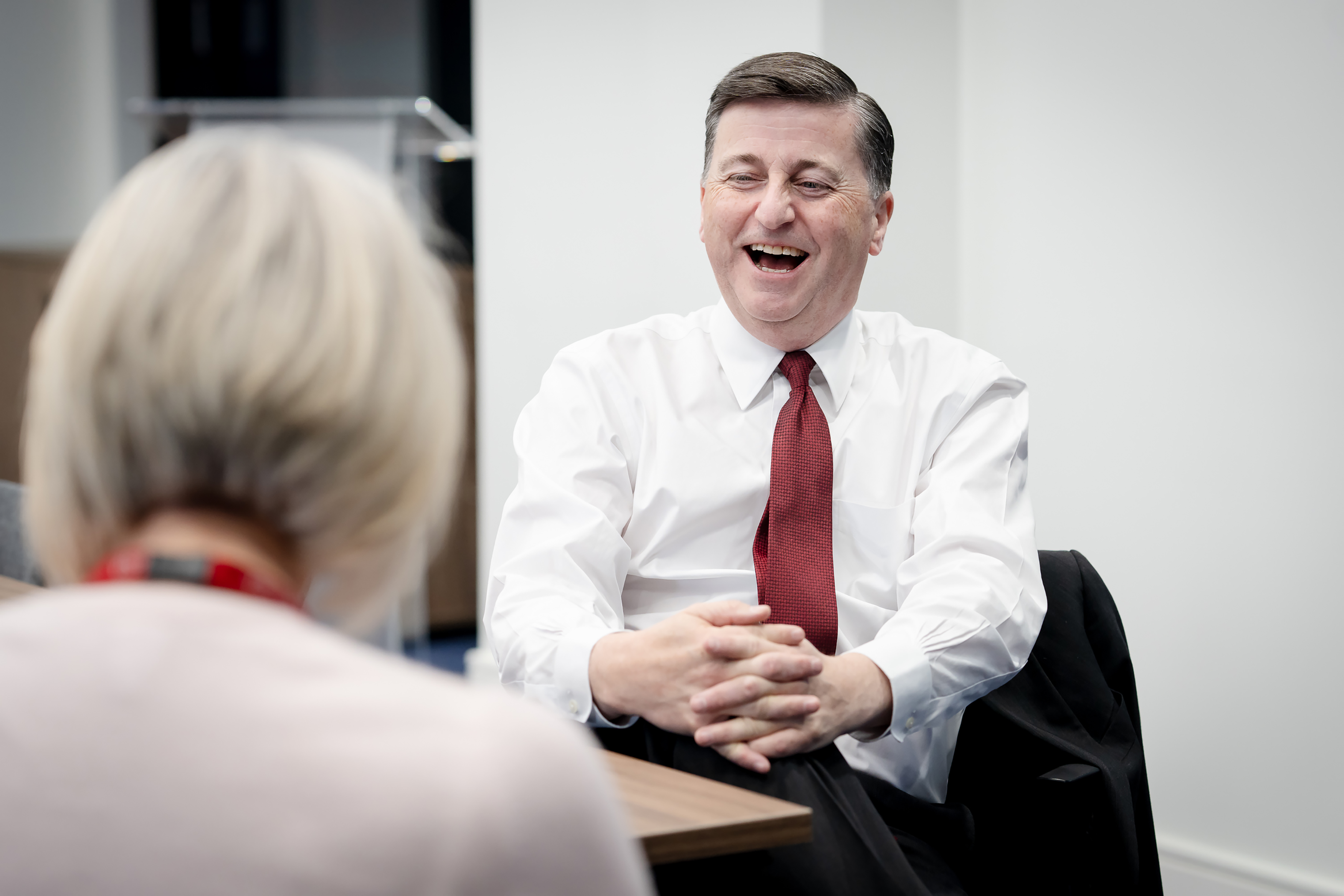
It’s an interesting insight because it’s fair to say that the Alexander of old might well have reacted differently – power and entitlement tends to do that to long-serving politicians. But electoral defeat, time out of the political bubble and the maturity of age has changed him. For the better. There’s a softness to the trade minister, a humility that serves him well, makes him more personable. And that’s not to say that he’s lost any of his passion to serve, his intellect is no less fierce, and his seriousness about his politics or vision for what he has been elected to do remain steadfast.
But he’s just easier within himself. And that wasn’t always the case. First time around, he was much more Gordon Brownesque in his approach to the media, perhaps dismissing the idea of presenting a more public personal profile as of lesser importance, trivial even, than of the serious job of running the country. This often led to him being seen as a bit buttoned-up. I am reminded of a story told by someone close to him at the time that having been persuaded to do a more personal profile as Secretary of State for Scotland, so that others could appreciate his more human side, he was raging at the resulting article in the Sunday Times that had described him as robotic. The fact that he had also been described as a future prime minister in the same piece seemed to pass him by.
There is no doubting that Alexander is a big political beast. He is an intellect, and he is serious about the business of politics. He likes to get things right and for some, that has meant he has appeared too rehearsed, less touchy-feely, but his instincts to serve are deep-rooted. As a son of the Manse, public service is in his blood. Alexander and I sit down less than a week after the death of his 89-year-old father, the Rev Douglas Alexander, who had conducted the funeral of Scotland’s first First Minister Donald Dewar in 2000 and who the trade minister accredits, along with his mother who was an NHS doctor, as being a role model in terms of public duty and using power for good.
For someone of his pedigree, motivation and political dedication, I suggest that defeat at the ballot box must have truly hit hard.
“Well, it wasn’t the funnest night I’ve ever had,” he laughs. “And honestly, I don’t spend much time thinking about it now, but even in the heat of the moment, I felt an immense sense of gratitude for having had the privilege of representing that community for 18 years. For me, having the chance to be a Labour MP here in Scotland was literally winning the lottery of life, and in that sense, I am glad that I had the presence of mind in the moment to express that gratitude on the night. My campaign had paid for two opinion polls in Paisley saying that I was going to lose, so I couldn’t really argue that I didn’t have any data suggesting that I wasn’t going to lose. But I decided to campaign in defiance of those numbers, basically, in denial of them, because I thought if you anticipate your defeat, you guarantee your defeat, and that’s really psychologically adaptive and unmotivating during the campaign, until you lose, at which point you’re like, what do I do next? And the truth is, in politics, you sometimes see the worst of human nature but also the best of human nature and literally, while I was on the stage in the Lagoon centre in Paisley, knowing I had lost, I started getting text messages, phone calls, emails on my then Blackberry, and I absolutely remember the kindness of those who reached out and tried to help for what would come next.”
And what Alexander did next was that he became a fellow at Harvard and a visiting professor at Chicago and New York universities, as well as taking a number of advisory roles, including advising U2 singer Bono on raising investment to tackle global poverty. He also became a seasoned commentator and a presenter on Radio 4, and had more time to spend with his family which he relished. He also got time to think about who he was and what he still wanted to achieve. So, I ask him what was it that eventually lured him back to frontline politics after a decade away?
“Well, honestly, I’ve absolutely loved my last 10 years, and I’m not sure there are many colleagues who were elected in 2015 – and believe me, I tried very hard to get re-elected – who would look back on the last 10 years, in whatever political party, and say that they’d love their life. In all seriousness, I tried very hard not to lose in 2015 and pretty much every aspect of my professional life got better when I lost. And that worries me in terms of continuing to encourage people to lean in and to choose politics as a vocation and as a calling, because it’s hard. It’s really hard, public life and politics today, we’re all volunteers, we’re not conscripts, and we certainly don’t seek public sympathy but it’s quite striking to me, having lived a life of glorious anonymity for most of the last 10 years, that it can be a tough shift for a lot of colleagues, particularly women.
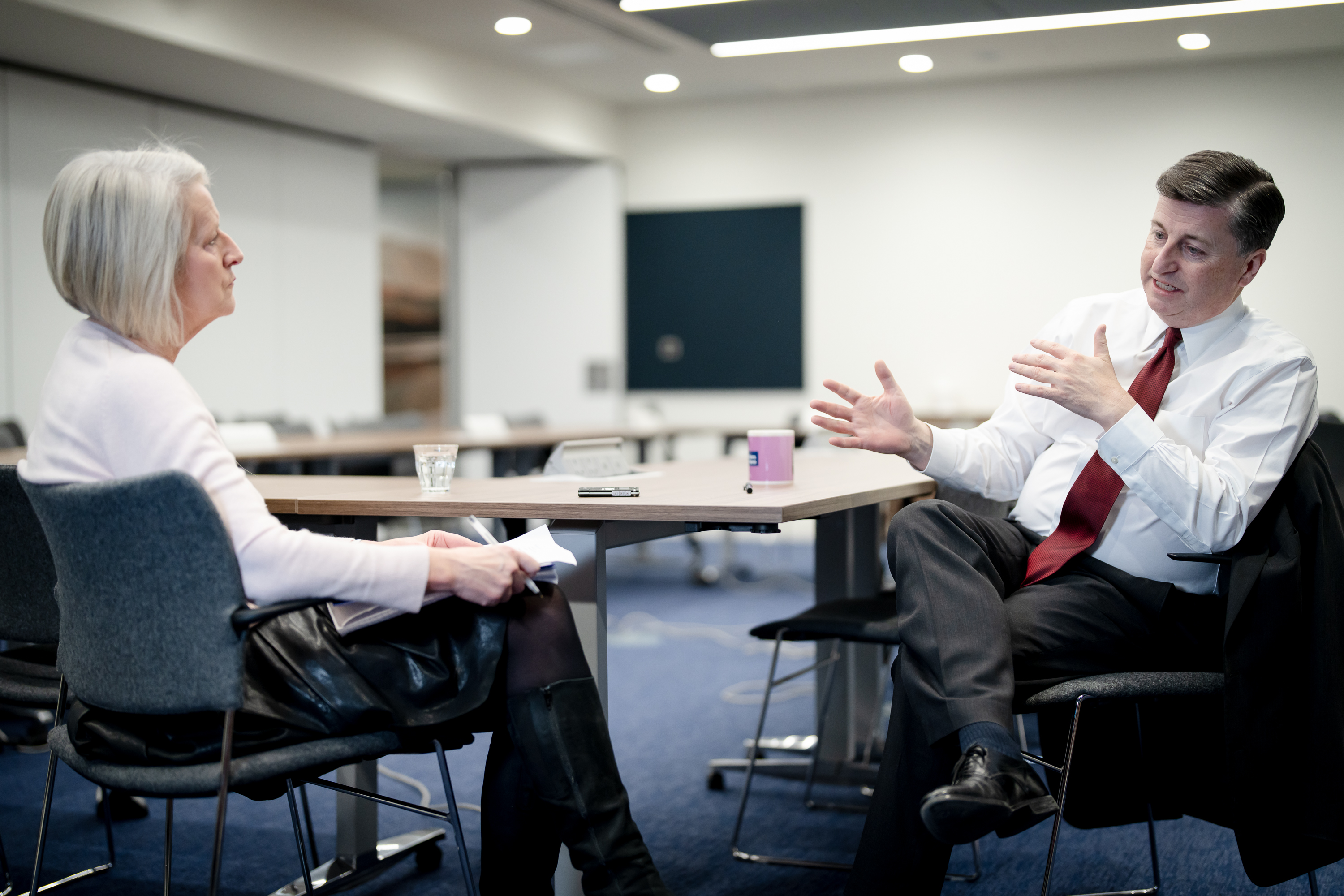
“I came back because at a fundamental level, I really love Scotland, and I think as a nation we can and we must be better. And I look back at my dad, who was a Church of Scotland minister, I look at my mum, who was an NHS doctor, they fundamentally believed a meaningful life was serving others at the most fundamental level, and I think I inherited that DNA. And so, despite the immense privilege of being a senior fellow at Harvard or teaching at NYU or working with an investment firm or consulting or law, when I got the telephone call saying, would I consider coming back – well, actually, I ignored it the first time, but ultimately, they [friends and colleagues in East Lothian] kept calling and I thought this is something that is meaningful and would be a worthwhile way to try and make a difference.
“One of the people I got to know really well in Harvard was Michael Ignatieff, and he went from being an academic at Harvard to leading the Federal Liberal Party in Canada and losing extraordinarily badly as the opposition leader trying to become the prime minister. But he said, for years at Harvard he had taught Machiavelli’s The Prince as a work of political philosophy. And there is a chapter on Fortuna, the goddess of fortune, and Michael told me that he’d taught it for years but never really understood why Machiavelli devoted an entire chapter to it. And he said, when you become a politician, you realise that your entire life is governed by fortune, you don’t get to choose when you’re on the stage, you don’t get to choose which other actors are on the stage, and you don’t get to choose what factors are affecting you. There is real wisdom in Michael’s words, in the sense that finding myself back making a contribution to a Labour government is so fundamentally unexpected, and so improbable given the last 10 years, that I approach it with a sense of humility, but honestly, exuberance. I can’t quite believe that I’m here.
“And I think I do come back with a different perspective. I don’t think I’ve ever told this story before to a journalist, but when I was Secretary of State for Scotland, Michael Forsyth got in touch with me, not a man I knew, but I had campaigned most of my youth against, asking if he could take me out for dinner. I thought, why on earth would Michael Forsyth want to take me out for dinner? And this was to ask if I would allow his portrait that had been painted by his Conservative friends to be unveiled in Dover House because there is a tradition which, I have to say, is observed on the Conservative side and not on the Labour side, of your friends painting a portrait of you when you’re the Scottish secretary. And so, during the dinner, he asked whether I would be willing to allow Margaret Thatcher to come to do the unveiling. Happily, it was a pre-social media era, so it was totally fine, and Margaret Thatcher came and she unveiled the picture. But in the course of the dinner, Michael said to me, do you mind if I give you a word of advice? I said, no, of course not. And he said, it will all be over sooner than you think. And with the conceit of youth, I listened to him but I didn’t really internalise the wisdom of what he was saying, but I have reflected a lot on those words. And I think having been given this extraordinarily improbable opportunity to come back into public service again, the psychology of it is very different than when you’re a younger man. This is a chapter of my life, it’s not the whole story, and actually, because I have the humility to know it’s a chapter, it makes me more impatient to try and make a difference when I have the chance to do so.
“I think I come back a changed and hopefully better politician, and I’m very conscious in the work I’m doing now that I am drawing on experience, knowledge, learnings that I think it would have been really difficult to acquire if I’d been elected in 2015 and been in the Commons for the last 10 years. So, I didn’t seek it, but yeah, there’s a huge amount that I learned, and I think time and distance lends perspective. I think it lends perspective about yourself, and it also lends perspective about the country and the challenges that the country is facing.”
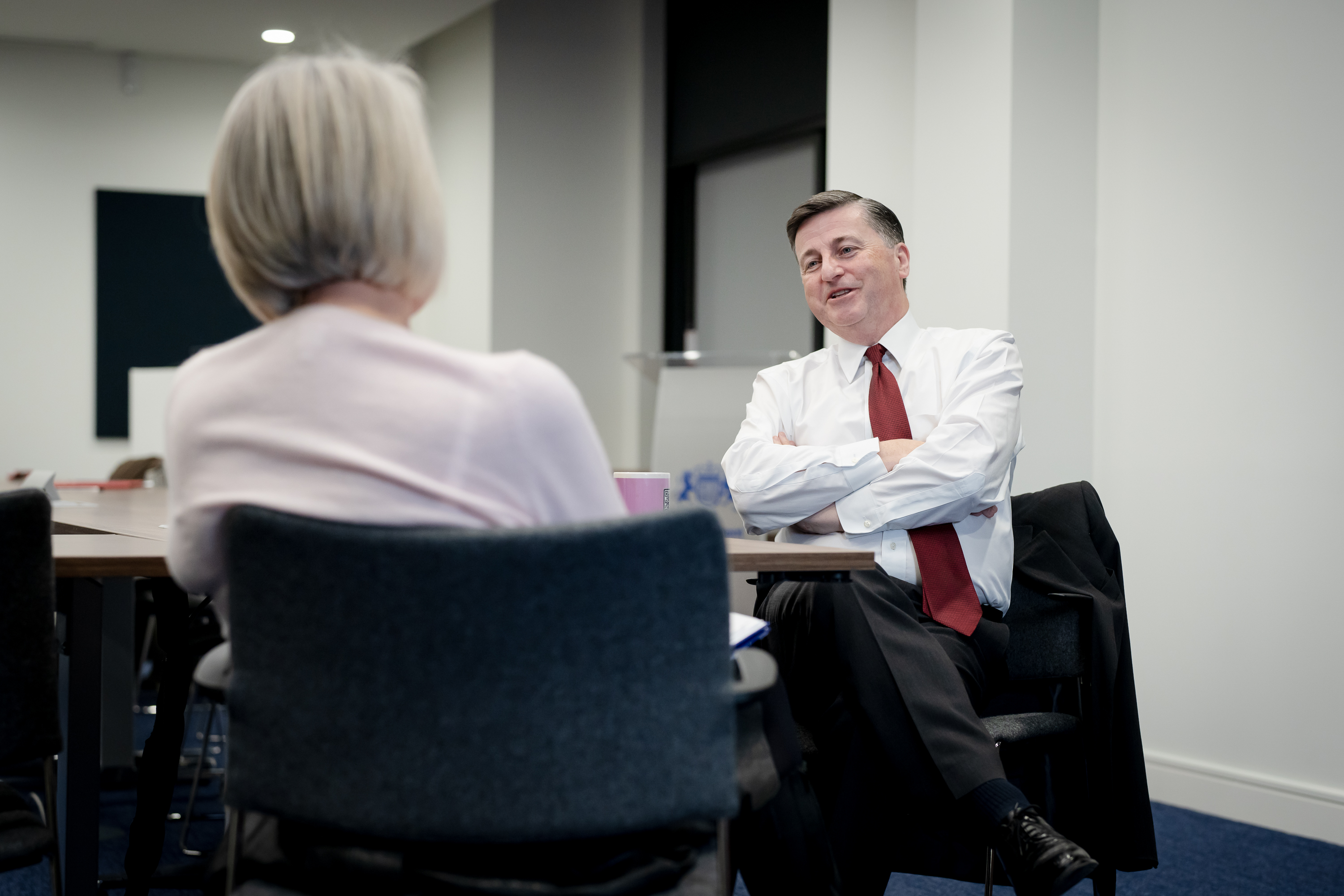
And there is no doubt that the country of today is very different to the one when he last left elected office a decade ago. The UK is no longer in the EU, we have been through a pandemic, we are onto our seventh prime minister and third first minister since then, the economy has gone through some dramatic hits and, as I write, Donald Trump returns to the White House for the second time. I ask the trade minister, who was an avowed supporter of the EU and who tells me that while as a democrat, he respects the decision that the country made to leave, he can’t yet see one advantage of Brexit, what his immediate reflections are on how different his role in government is now compared with when Labour was last in power.
“Gosh, well, we’re in a very different world. When I was first elected the UK economy was bigger than the Chinese economy. The Chinese economy is now five times the size of the British economy. We were still governing a major Asian city in terms of Hong Kong, and we hadn’t seen China’s rise or Russia’s return in a way that has come to dominate geopolitics in recent years. So, both geo-economically and geopolitically, we’re in a radically different place.
“I think a lot of the promise and potential of the early years of this millennium have been disappointed by a more regionalised, protectionist and divided world than many would have hoped for, but my own background in government was in international development, and there we’ve seen extraordinary progress. If you look at the proportion of the world’s population living in extreme poverty during my lifetime, it’s a tremendous success story. You look at HIV, antiretrovirals, look at vaccinations, we’ve made extraordinary progress. There are bright, shining stars and sometimes it is too often characterised as dark skies.”
For many, Brexit would fall into that characterisation of a dark sky, and as trade minister Alexander has not shied away from the elephant in the room. While Labour does not support rejoining the EU, he has pledged to put Europe back at the heart of Britain’s commercial policy. Speaking just two months after the general election, at a jubilant Labour Party conference, he attacked the trade policy pursued by governments since the 2016 Brexit referendum, taking a swipe in particular at his Tory predecessor in the role, Liz Truss.
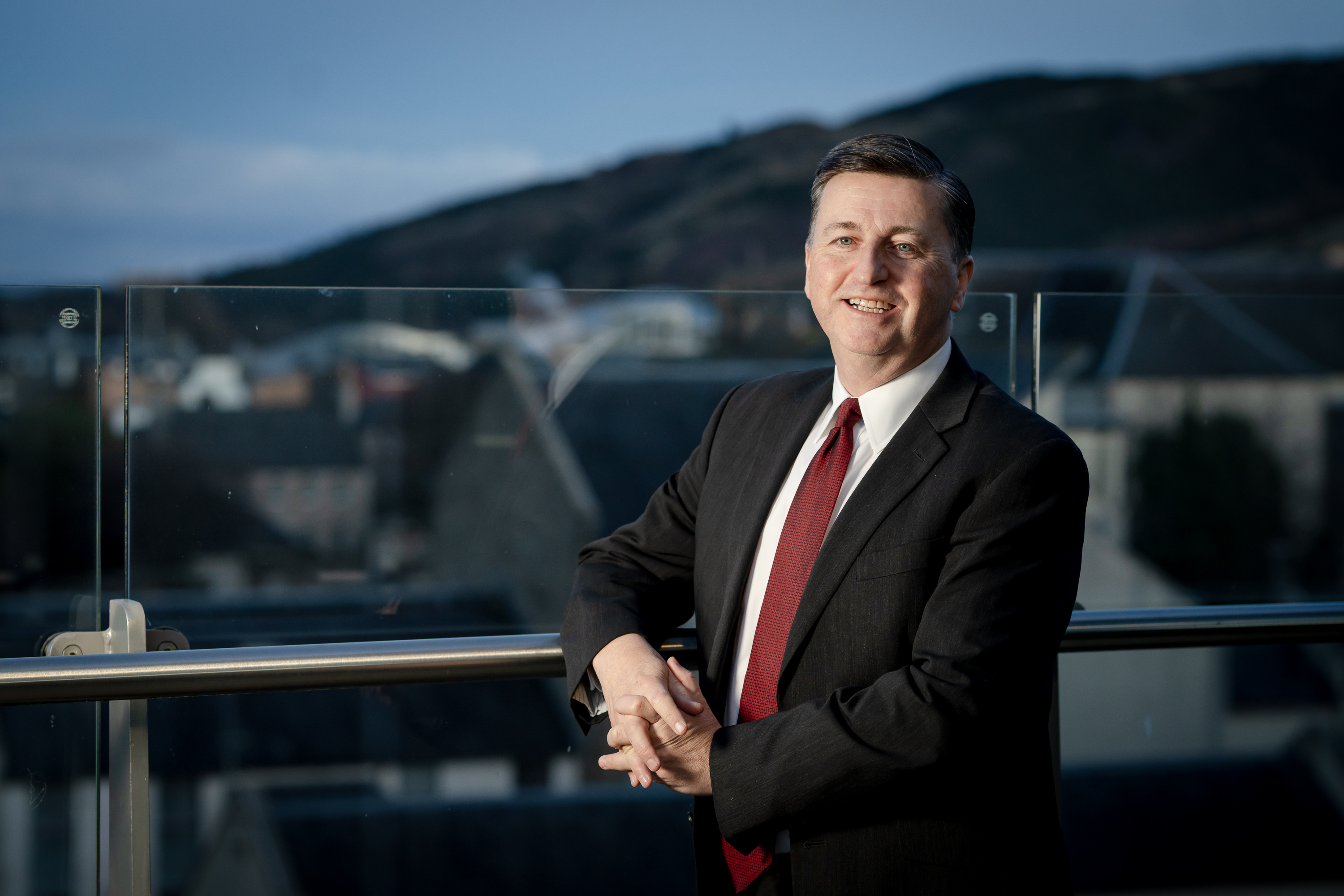
He said: “We’ve had a lot of post-imperial delusion in British trade policy in recent years. Post-2016, the idea that trade deals with Australia and New Zealand – however worthwhile – in any way touch the sides of leaving the deepest single market that we were a part of – which is called the European Union... The lack of stability that has been talked about meant that the political risk associated with investing in the UK was priced in a way more akin to an emerging market than an established OECD country.”
Alexander claimed that the previous Conservative government rushed to sign trade agreements to divert attention from the substandard deal it had struck with the EU. He said that the UK’s position in the world had been diminished. And in a further dig at former prime minister Truss, who was also previously trade secretary, Alexander said: “Our trade strategy will be based on data, not delusion. I’m more interested in getting good deals that help UK growth than getting my picture on Instagram.”
Since then, his feet have hardly touched the ground. In December, the UK became the first new member of the Comprehensive and Progressive Agreement for Trans-Pacific Partnership (CPTPP) since it was formed in 2018 and now gets to help shape the future of the 12-member body which features some of the fastest-growing economies across Asia. Alexander has said he would revive trade talks started by the Conservative government with India and Gulf states but would not do deals at any price. And while he is also seeking to restart talks with Israel, South Korea, Switzerland and Turkey, he has made it clear that a principal focus will be on rebuilding post-Brexit trade links with the EU. “Europe was an absence not a presence in the thinking of trade ministers in the previous government. For all the talk about the death of distance, geography still matters with trade,” he said. “It’s no surprise the UK’s biggest trading relationship is with the EU; it accounts for 47 per cent of the UK’s total trade.”
Much has changed in the world, even since Alexander made that speech at conference just four months ago, and now with a newly installed president of the United States, who has described ‘tariff’ as “the most beautiful word in the dictionary”, comes the potential for further strains on Britain’s trading relationships. I wonder if Alexander fears future trade deals with the US could be affected by loose language from colleagues like David Lammy, who had previously labelled Donald Trump a “neo-Nazi sociopath”.
“Look,” says Alexander patiently, and clearly keen not to be drawn on the row about past comments made about Trump, “it’s in the nature of diplomatic relations that you talk to everyone. But of course, in the United States, we have deep and abiding people-to-people ties, shared history, shared interests, deep security relationships, and deep economic relationships, and those will endure whoever the American people elect as their president.
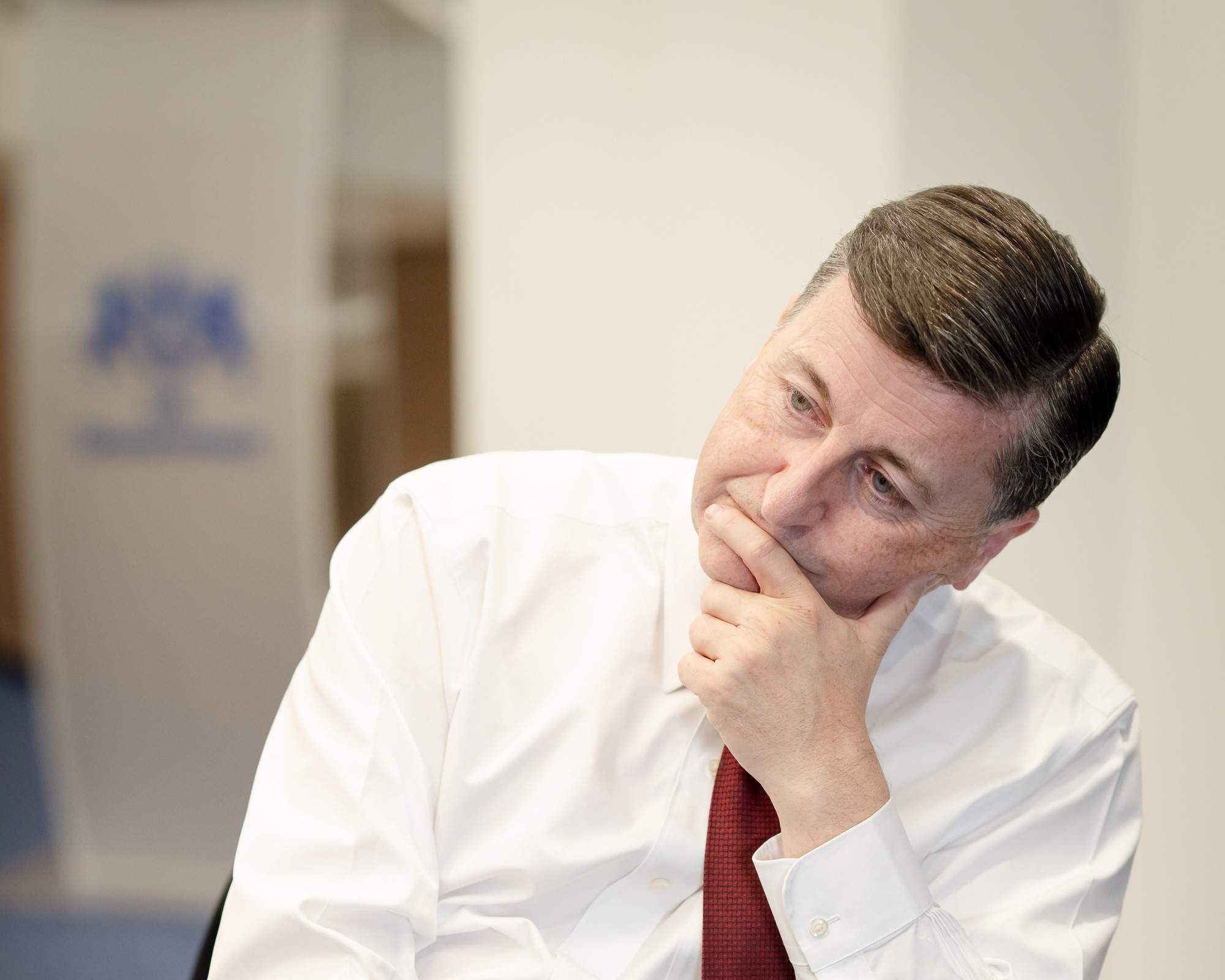
“I’m honestly less interested in what colleagues said in the past than how we figure out navigating the future. And the truth is, there are going to be important and challenging conversations that we need to have along the way as we do everything we can to grow the economy. That’s what we need to be focused on. And I am.”
During the course of our conversation, Alexander tells me that when the prime minister offered him the role of trade minister, he had said that he wanted a Scot doing the job. It’s an interesting insight and I ask Alexander if, given some of the big beasts Scotland has had at Westminster during his time in the previous Labour government, does he think Scots are inherently good at politics?
“Interesting. I don’t know. I’ve always been wary of Scottish exceptionalism, proud though I am of our history and our culture and our literature. I always wondered with that generation that you are referring to whether it was the fact that the Scottish media was so robust at the time that if you could survive in Scotland, and you could manage dealing with, you know, Kenny Macintyre on BBC Radio Scotland, or you could manage dealing with Jim Naughtie or Kirsty Wark on UK coverage, then you earned your spurs. I think we care about our politics deeply and I think if you look at other figures who have come up through the Labour movement, we happened to be blessed with, when I was young, an extraordinary generation of Scots: Robin Cook, Donald Dewar, John Smith, Gordon Brown, Alistair Darling – on any reckoning, they were giants. And yes, I think it’s an interesting question for a PhD or for the history books as to what explains that but yes, when Keir appointed me to the role of trade minister, he specifically referenced the fact that he wanted a Scot doing it. So, in that sense, I’m proud to be hopefully, in some small way, continuing that tradition of those that came before me.
“In many ways, the Palace of Westminster is filled with ghosts for me. I first walked across the threshold in 1990, working as a researcher for a year before coming back to Edinburgh to do law. And so, when you go to Strangers [one of parliament’s bars] or to the canteen, I walk past the office that I know was the office that John Smith worked in when he was shadow chancellor, not even when he was leading the Labour Party, and so it goes on.
“I think that’s just an aspect of being older that you are acutely aware of those who have gone before and for no one is that as true as Alistair [Darling]. I mean, he wasn’t just a friend, he was an inspiration in the way he did politics. And Alistair was a rubbish performative politician, but he was a brilliant principled politician, and he was so fundamentally in politics for the right reasons that it gives you faith that it’s still possible to serve in a government, and in his case, do extraordinarily important, consequential work, and not be dragged into a lot of the toxicity and diminishing aspects of our public life. He was just… -he was one of the good ones. And you’re right, it is a tragedy that often it takes their passing for that to be acknowledged. I mean, my biggest lesson from Alistair’s funeral was that this was a friend and a colleague with whom I’d served in the Cabinet, who was chancellor at the time of the financial crisis, led the referendum campaign, and neither of those seismic events or issues featured much in his funeral, because there wasn’t space to acknowledge that political contribution relative to what an extraordinary family man and father and husband and friend that he was. And I thought then that he basically lived a good life and must have got a lot right when you can be that important in politics and it can be that unimportant in your eulogy.”
Holyrood Newsletters
Holyrood provides comprehensive coverage of Scottish politics, offering award-winning reporting and analysis: Subscribe